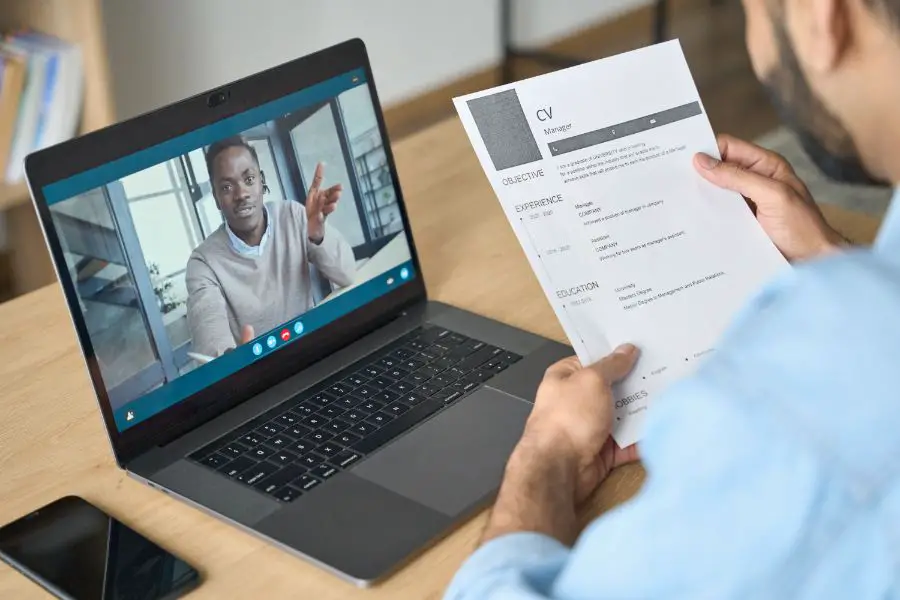Disclaimer: We sometimes use affiliate links in our content. For more information, visit our Disclaimer Page.
As remote work continues to gain popularity, hiring managers must adapt their interview process to better understand if a candidate is the right fit for a remote job. In this blog post, we’ll cover various interview questions for remote work that can help determine if a candidate has the skills and mindset needed to excel in a remote setting.
The Rise of Remote Work

Remote work has become increasingly common due to advancements in technology and the realization that employees can be productive while working remotely. This shift has led to a growing number of remote jobs available and a demand for remote workers who can successfully navigate the unique challenges of remote work life.
The Importance of Interview Questions for Remote Work
To ensure a successful remote work experience, both for the company and the remote worker, it’s essential to ask targeted interview questions during the hiring process. These questions should focus on the candidate’s ability to work independently, communicate effectively, and manage their time and tasks efficiently in a remote work environment.
Assessing Remote Work Skills and Experience
Before diving into specific interview questions, it’s essential to understand the overall context of remote work and the various aspects that make it different from traditional office settings.
Previous Remote Working Experience
One of the first questions to ask remote candidates is whether they’ve worked remotely. If they have, it’s important to understand the extent of their remote working experience and how they’ve navigated the challenges of working remotely.
Work Environment
A candidate’s work environment is crucial to their ability to perform well in a remote job. During the interview process, inquire about their home office setup, including their access to a wired internet connection and whether they have a dedicated workspace or prefer working from a coffee shop or other public location.
Office Server and Technical Support
Working remotely requires employees to have reliable access to the company’s office server and the necessary technical support to address any issues that may arise. Ask remote candidates about their experience accessing an office server privately and how they’ve handled technical problems in the past.
Communication Platforms and Tools
Effective communication is essential for remote teams, and hiring managers should ask about a candidate’s familiarity with different communication tools and platforms. This will help determine if they can quickly adapt to the company’s communication style and preferred tools.
Soft Skills for Remote Work Success
Soft skills are crucial for remote workers, as they often need to navigate challenges without the immediate support of a manager nearby. During the interview process, focus on assessing a candidate’s ability to work independently, problem-solve, and collaborate effectively with a distributed team.
Time Management and Organization
Remote work allows employees to have more control over their schedule and work environment. However, it also requires excellent time management and organizational skills. Ask remote candidates about their strategies for staying organized and managing their time while working remotely.
Adapting to Company Culture and Team Dynamics
It’s essential for remote employees to fit in with the company culture and work well with their team members. During the interview process, discuss the candidate’s experience working with remote teams and how they’ve adapted to different company cultures in the past.
Remote Work Challenges and Solutions
Every remote job comes with its own unique challenges, and it’s important to understand how a candidate has navigated these obstacles in the past. Ask about their most challenging project or situation while working remotely and how they overcame it.
Professional Growth and Development
Remote workers need to take charge of their professional growth, as they may not have the same opportunities for in-person collaboration and networking as those in an office environment. Inquire about a candidate’s plans for pursuing remote work and how they’ve sought professional development opportunities in the past.
Company’s Team Building Opportunities
To ensure a loyal and stellar employee, it’s essential to understand how they’ve participated in team-building activities and fostered connections with their colleagues in previous remote positions. Discuss the company’s team-building opportunities and ask about the candidate’s experience with team bonding in a remote setting.
Communication Style and Conflict Resolution
Remote work requires a strong ability to communicate effectively and handle conflicts when they arise. During the interview process, ask remote candidates about their communication style and how they’ve resolved conflicts with team members in the past.
Related: Interview Questions for Critical Thinking
Types of Interview Questions for Remote Work

Now that we’ve covered the broader context of remote work let’s dive into specific interview questions for remote work that can help you identify the right remote employee for your organization.
Experience-Related Interview Questions
- How many years of remote work experience do you have? In what roles and industries?
- What challenges have you faced while working remotely, and how did you overcome them?
- How have you ensured that your work environment is conducive to productivity in a remote setting?
Time Management and Organization Interview Questions
- How do you manage your time and prioritize tasks when working remotely?
- Can you provide an example of a time when you successfully managed multiple projects or deadlines in a remote setting?
- How do you stay organized and on top of your tasks in a remote work environment?
Communication and Collaboration Interview Questions
- What communication tools have you used in previous remote positions? Which ones are you most comfortable with?
- How do you maintain open lines of communication with your team members while working remotely?
- Can you share an example of a successful remote collaboration you were part of? What made it successful?
Company Culture and Team Dynamics Interview Questions
- How do you build and maintain relationships with your colleagues in a remote work setting?
- How have you adapted to different company cultures while working remotely?
- How do you stay engaged and connected to your remote team?
Professional Growth and Development Interview Questions
- What steps have you taken to continue your professional development while working remotely?
- How do you seek feedback and opportunities for growth in a remote work environment?
- What are your long-term career goals in relation to remote work?
Problem-Solving and Decision-Making Interview Questions
- How do you approach problem-solving in a remote work setting?
- Can you provide an example of a difficult decision you had to make while working remotely? How did you approach the decision-making process?
- How do you stay informed and up-to-date on industry trends and best practices for remote work?
Technical Skills and Remote Work Tools Interview Questions
- What types of project management software have you used in your remote work experience?
- How do you ensure that your home office setup meets the technical requirements for your remote job?
- How do you handle technical issues that may arise while working remotely?
Work-Life Balance and Personal-Life Interview Questions
- How do you maintain a healthy work-life balance while working remotely?
- How do you handle distractions and stay focused while working from home?
- How do you separate your personal life from your work life in a remote setting?
Related: Questions To Ask a New Employee
Best Practices for Remote Job Interviews

Conducting a remote job interview requires a slightly different approach than traditional in-person interviews. Here are some best practices to help you navigate the remote interview process and ensure a successful experience for both you and the candidate.
Prepare for the Interview
Just like any other job interview, preparation is key. Make sure you have a clear understanding of the job posting and the specific skills and experience required for the remote position. This will help you tailor your interview questions to the candidate and make the most of the interview process.
Set Clear Expectations
Ensure that the candidate understands the remote job requirements, including the company’s communication, collaboration, and performance expectations. This will help set the stage for a successful remote work experience and minimize potential misunderstandings.
Choose the Right Remote Interview Platform
Select a reliable video conferencing platform for the remote job interview. Ensure you and the candidate can access and are comfortable using the platform. Test your audio and video settings beforehand to avoid technical difficulties during the interview.
Be Mindful of Time Zones
When scheduling remote job interviews, be aware of time zones and try to find a mutually convenient time for both you and the candidate. This demonstrates your respect for the candidate’s time and helps create a positive impression of your company as a remote-friendly employer.
Create a Welcoming Atmosphere
Remote interviews can be just as nerve-wracking as in-person interviews. Try to create a welcoming and friendly atmosphere during the remote interview, which can help put the candidate at ease and encourage open and honest communication.
Ask Open-Ended Questions
Asking open-ended interview questions allows the candidate to provide more in-depth and thoughtful responses. This can help you better understand the candidate’s remote work experience, skills, and mindset.
Take Notes and Record the Interview (with Permission)
Taking notes during the remote job interview can help you remember key points and impressions after the interview is over. If possible, ask the candidate for permission to record the interview, which can serve as a valuable reference when making your final hiring decision.
Follow Up and Provide Feedback
After the remote interview, follow up with the candidate to thank them for their time and provide any feedback or updates on the hiring process. This demonstrates your professionalism and commitment to finding the right remote employee for your organization.
Evaluating Remote Candidates

Once you’ve conducted the remote job interview, it’s time to evaluate the candidate based on their responses and overall fit for the remote position. Here are some factors to consider when evaluating remote candidates.
Remote Work Experience and Skills
A candidate’s previous remote work experience and skills developed in those roles can provide valuable insights into their potential success in a new remote job. Consider their responses to questions about time management, organization, communication, and problem-solving in a remote setting.
Adaptability and Flexibility
Remote work often requires adaptability and flexibility, as remote workers may need to navigate changes in project requirements, team dynamics, or company culture. Look for evidence of adaptability and flexibility in the candidate’s responses to interview questions and their remote work history.
Cultural Fit and Team Compatibility
A candidate’s ability to fit in with your company culture and work well with existing team members is critical for success in a remote job. Evaluate the candidate’s responses to questions about team dynamics, collaboration, and cultural fit to determine if they are likely to thrive in your organization’s remote work environment.
Professional Growth and Development
The right remote employee will be committed to their professional growth and development, even when working remotely. Consider the candidate’s responses to questions about their long-term career goals and plans for pursuing remote work to gauge their dedication to professional growth.
Technical Skills and Remote Work Tools
A strong remote candidate should be proficient in various remote work tools and platforms that your organization uses. Assess the candidate’s familiarity with these tools and their ability to learn new technologies quickly.
Related: Interview Questions for Internal Promotions
Conclusion
Hiring the right remote employee is crucial for the success of your remote team and company. By carefully considering the unique challenges and requirements of remote work, asking targeted interview questions, and following best practices for remote job interviews, you can identify the ideal candidate for your remote job opening.
Remember, the key to a successful remote work experience lies in finding a candidate who not only possesses the necessary skills and experience but also demonstrates the adaptability, flexibility





